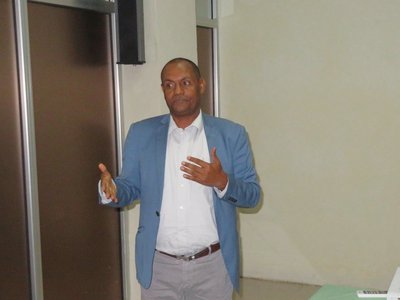

Fentahun Mengistu Tiruneh started his career in 1989 as an entomologist for the Ethiopian Science and Technology Commission in Ambo. He then worked for nearly 20 years as an entomologist, pathologist, and horticultural crop researcher, in addition to research leadership positions at Adet Agricultural Research Centre and Amhara Regional Agricultural Research Institute (ARARI).
Shortly after receiving his PhD from BOKU University in 2008, he was appointed Director General of the ARARI, which has eight research centres and over 1,000 staff. From 2013 to 2017, he was the Director General of the Ethiopian Institute of Agricultural Research (EIAR), an apex government research organisation, responsible for managing its headquarters and 17 federal research institutes with over 4,000 staff.
Fentahun then spent a year as a senior agronomist for Tufts University / USAID in Addis Ababa. For the past five years, he has been the Country Director for the Ethiopian office of the Sasakawa Africa Association (SAA), an international non-governmental organisation (NGO). He is responsible for the management, supervision and direction of all country activities related to agricultural extension and the promotion of improved technologies and innovations for smallholder farmers.
He is also an Adjunct Associate Professor of Horticulture at Bahir Dar University. He has supervised/co-supervised s postgraduate, PhD and MSc students, served as external examiner for several other postgraduate students, authored/co-authored more than 60 publications including two books and is a Fellow of the Ethiopian Academy of Sciences.
Reflections of his studies in Austria
His education/scholarship in Austria has had a tremendous impact on his development as an individual, enabling him to rise to the highest level of agricultural research leadership in the Ethiopian National Agricultural Research System. In terms of professional development, his education/scholarship in Austria enabled him to acquire broader theoretical and practical knowledge and skills that prepared him to engage in broader research and development activities in a real-world setting and to perform competitively and effectively. His education in Austria made a positive difference to his life, enabling him to gain confidence and work independently, and to work in a multicultural and multilingual environment.
Drawing on his extensive experience in leadership, research and development, his future plans are to continue contributing not only to Ethiopia but also regionally and globally, especially in the emerging frontiers of science and technology, while acquiring new knowledge and skills. He is interested in forging strong partnerships with local and international organisations to increase synergy and impact for a shared future.
Current research on Regenerative Agriculture
His current research is broadly focused on Regenerative Agriculture (RA). He is interested in RA because it promises a new agricultural future by regenerating and enhancing soils, biodiversity and ecosystems.
What makes it exciting is that it takes a systems approach to agriculture, allowing us to see things in their entirety, linking agriculture and the environment, people and nature, and looking back at traditional farmers' wisdom and combining it with scientific agriculture, with farmers in the driver's seat.
By promoting RA, he aims to achieve improved soil health and fertility and increased agrobiodiversity, which will contribute to higher sustainable agricultural productivity, diverse and nutritious food, and climate change adaptation and resilience within planetary boundaries.
RA is very important for Ethiopia because it suffers from the worst land degradation of any country in sub-Saharan Africa. Soil erosion, declining soil fertility, loss of soil organic matter, acidity, drought, salinity and ecosystem degradation are all serious problems. Much of the country's biodiversity is under constant threat of disappearance due to unsustainable use of natural resources and replacement of local varieties/breeds with improved ones. As a result, farmers and ecosystems have been exposed to the impacts of environmental degradation and climate change, reducing their adaptive capacity and resilience, leading to a vicious cycle of complex problems of low productivity, food insecurity and poverty. He is currently involved in an international consortium research project in which the Sasakawa Africa Association, the International Institute of Tropical Agriculture (IITA), and Soft Bank Corp are collaborating to generate evidence on the benefits of Regenerative Agriculture, such as carbon sequestration and reduced greenhouse gas emissions.
Doctoral studies
The topic of his PhD studies was “Fruit tree species in the wild and in homegarden agroforestry: species composition, diversity and utilization in western Amhara region, Ethiopia". Fentahun received a scholarship financed by the Austrian Development Cooperation (ADC). Together with his supervisor published three articles from his thesis in international peer-reviewed journals. He also received a research grant from the International Fund for Science (IFS) to continue his research on this topic.
For his project "The role of homegardens in food and nutritional security improvement: potentials, constraints, opportunities, and state of exploitation in the western Amhara region" he received an Alumni Grant (funded by ADC). This allowed him to consolidate the knowledge he had gained at BOKU, especially during his thesis research, and to raise awareness among policy makers, development practitioners and researchers about the importance of home gardens, their limitations, potentials and missed opportunities.
After completing his PhD, he was involved in the APPEAR project "Strengthening Rural Transformation Competences of Higher Education and Research Institutions (TRANSACT) in the Amhara Region, Ethiopia", a collaboration between BOKU University, Gondar University, Bahir Dar University and the Amhara Region Agricultural Research Institute.
